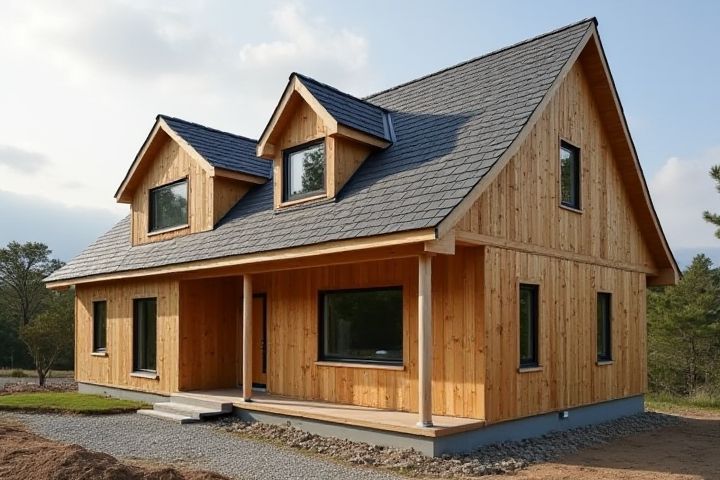
When building a house, consider the location and its impact on your lifestyle and property value, as proximity to schools, work, and amenities is crucial. Evaluate your budget, ensuring to account for land acquisition, labor, materials, and potential hidden costs like permits and inspections. It's important to choose a sustainable design that reflects your personal style while embracing energy efficiency and eco-friendly materials. Assess zoning regulations and local building codes to avoid future compliance issues, which can incur significant time and expense. Lastly, plan for future needs, such as family growth or resale potential, to ensure your home remains functional and valuable over time.
What To Consider When Building A House
Budget planning
Budget planning is a crucial aspect of building a house, typically encompassing 15-20% of the total project cost for contingencies. Start by establishing a clear overall budget, factoring in land costs, design fees, permits, and construction expenses, which can average around $150 to $200 per square foot, depending on your location. Allocate funds for essential items such as foundation, framing, roofing, and interior finishes, while considering potential unexpected costs that could arise, estimated at 10-15% of your total budget. You should also keep a close eye on financing options, which can significantly impact your overall expenditure and long-term affordability.
Zoning laws
Zoning laws govern land use and dictate how your property can be developed, including the types of structures allowed, their height, and their placement on the lot. Before starting your project, research local zoning regulations, as each municipality may have varying rules that can affect your design and budget. For instance, in many areas, setbacks and lot coverage restrictions ensure that homes maintain certain distances from property lines and do not occupy more than a specified percentage of the lot. Violating these laws can lead to fines or the need for costly modifications, making it crucial for you to consult with local zoning boards or a planning specialist early in the planning phase.
Energy efficiency
When building a house, prioritize energy efficiency to reduce long-term costs and environmental impact. Opt for high-quality insulation, which can improve thermal performance by up to 30%, ensuring a comfortable indoor temperature throughout the year. Incorporate energy-efficient windows with double or triple glazing to minimize heat loss, as they can reduce energy bills by approximately 15%. Selecting an ENERGY STAR-rated heating, ventilation, and air conditioning (HVAC) system can further enhance your home's efficiency, potentially lowering energy consumption by up to 50%.
Material selection
When building a house, material selection plays a crucial role in ensuring durability, energy efficiency, and aesthetic appeal. You should consider the local climate, as materials like fiber cement siding may be ideal for areas prone to moisture, while brick offers excellent thermal mass in cooler regions. Additionally, evaluate the sustainability of materials, opting for products like reclaimed wood or recycled steel that minimize environmental impact. Finally, balance cost with long-term maintenance requirements, as high-quality materials may have a higher upfront cost but can save you money on repairs and replacements in the future.
Floor plan design
When building a house, the floor plan design is crucial for functionality and aesthetics. Consider the layout, which typically includes essential areas such as bedrooms, bathrooms, and a kitchen, ensuring they are strategically organized for easy flow and accessibility. Pay attention to the square footage of each room; for example, an average master bedroom is around 300 to 400 square feet. Also, factor in natural light and ventilation by positioning windows appropriately, as this greatly influences energy efficiency and overall comfort in your new home.
Contractor reputation
When building a house, prioritizing contractor reputation is crucial for ensuring quality and reliability. Look for contractors with a proven track record in successful projects, ideally with at least five years of experience in residential construction. Check for reviews and ratings on platforms like Angie's List or Yelp, and consider obtaining references from previous clients to gauge satisfaction levels. A reputable contractor should also be fully licensed and insured, providing peace of mind throughout the building process.
Building permits
When building a house, securing the appropriate building permits is crucial to ensure compliance with local regulations. Your application process often requires detailed plans, specifications, and potential environmental impact assessments. It's essential to check with your local zoning office to understand specific requirements, as they can vary widely by location and project type. Failure to obtain the necessary permits can lead to costly fines and may delay the construction process significantly.
Safety standards
When building a house, prioritize adherence to safety standards, which can significantly reduce the risk of accidents and structural failures. Familiarize yourself with local building codes, which may require specific fire safety measures and foundation integrity assessments. Incorporating materials that meet safety certifications, such as non-combustible insulation and impact-resistant windows, enhances durability and security. Regular inspections during the construction process, including electrical and plumbing systems, ensure compliance with safety regulations and protect your investment.
Weather considerations
When building a house, you should prioritize weather considerations to ensure durability and comfort. Climate-specific elements like insulation, roofing materials, and window placement can greatly affect energy efficiency and temperature regulation. For example, in areas prone to heavy snowfall, a sloped roof design can prevent snow accumulation, while in hurricane-prone zones, reinforced structures and impact-resistant windows are essential. Additionally, incorporating drainage systems and landscaping techniques can help manage water runoff and minimize flood risks.
Future-proofing
When building a house, consider incorporating energy-efficient systems such as solar panels and advanced insulation materials to reduce energy costs by up to 50%. Select a flexible floor plan that allows for easy reconfiguration, accommodating future changes in lifestyle or family size. Opt for smart home technology, which can enhance security, convenience, and energy management, potentially increasing property value by 10-15%. Invest in quality materials that offer durability, as they can minimize long-term maintenance costs and enhance resale potential in an ever-evolving market.
